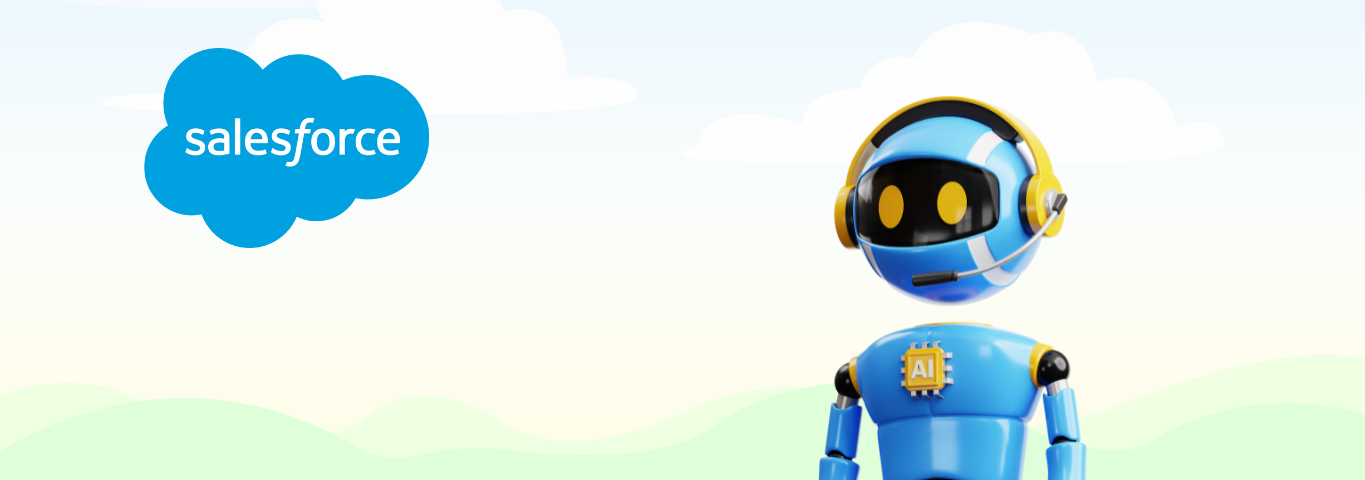In today's fast-moving business world, where competition is the top priority and customer expectations are higher than ever, companies constantly look for ways to stay ahead. One such revolutionary approach is the integration of artificial intelligence (AI) into customer relationship management (CRM) systems, and we can make this possible now by using Salesforce.
The Evolution of Salesforce:
Salesforce, founded in 1999, has grown to become the world's leading CRM platform. It empowers businesses to manage customer relationships, streamline processes, and drive growth. Over the years, Salesforce has continuously innovated, introducing new features and capabilities to meet its users' evolving needs.
How does Salesforce use artificial intelligence?
Artificial Intelligence has become a game-changer in CRM systems like Salesforce, enhancing its capabilities far beyond traditional CRM functionalities. AI enables Salesforce to analyze vast amounts of data, uncover valuable insights, and automate routine tasks, freeing up sales teams to focus on what matters most: building relationships and closing deals.
The AI Revolution in Salesforce
- Enhanced Customer Insights: AI algorithms can analyze vast amounts of customer data captured within Salesforce, providing businesses deep insights into customer preferences, behaviors, and trends. This allows for highly personalized marketing campaigns and targeted sales strategies.
- Automation of Routine Tasks: AI-powered workflow automation within Salesforce can handle tasks such as data entry, lead prioritization, and scheduling follow-ups. This frees up valuable time for sales teams to focus on building relationships and closing deals.
- Predictive Analytics: By leveraging historical data and machine learning models, Salesforce AI can predict future trends, customer churn probabilities, and sales forecasts with impressive accuracy. This foresight enables proactive decision-making and strategic planning.
- Improved Customer Service: AI-driven chatbots integrated with Salesforce customer service can respond instantly to customer inquiries, resolve common issues, and escalate complex queries to human agents when necessary. This results in faster response times and enhanced customer satisfaction.
- Efficient Resource Allocation: AI algorithms optimize resource allocation by identifying inefficiency or underutilization within business processes. This ensures that resources such as time, staffing, and budget are allocated where they can have the most significant impact.
What are the benefits of Salesforce AI Integration?
- Increased Efficiency: AI automates repetitive tasks, such as data entry and lead qualification, allowing sales teams to focus on strategic activities that drive revenue.
- Enhanced Customer Insights: By analyzing customer behavior and preferences, AI-powered Salesforce provides deeper insights into customer needs, enabling personalized interactions and targeted marketing campaigns.
- Improved Sales Performance: AI-driven analytics and forecasting help sales teams identify opportunities earlier, shorten sales cycles, and achieve higher conversion rates.
The Future with Salesforce and AI:
As AI continues to evolve, its integration with Salesforce promises even more incredible advancements. Future developments may include more sophisticated predictive capabilities, expanding automation functionalities, and enhanced natural language processing for more intuitive interactions.
In conclusion, the synergy between Salesforce and AI represents a significant opportunity for businesses to stay competitive and thrive in an increasingly digital world. By harnessing the power of AI within Salesforce, organizations can unlock new efficiencies, deepen customer relationships, and pave the way for sustained growth and innovation.
In essence, Salesforce's collaboration with AI isn't just about technology—it's about empowering businesses to achieve more, connect better, and create lasting value in a rapidly changing landscape.
Introducing Salesforce Einstein Copilot
In modern business operations, staying ahead means embracing cutting-edge technologies that drive efficiency, enhance customer experiences, and streamline decision-making processes. One such transformative innovation is Salesforce Einstein Copilot, an advanced AI-powered assistant integrated into the Salesforce ecosystem.
Let's delve into how Salesforce Einstein Copilot reshapes business intelligence and drives organizational success.
Understanding Salesforce Einstein Copilot
Salesforce Einstein: Einstein is Salesforce's AI technology stack, designed to infuse AI capabilities across its various cloud offerings. It leverages machine learning, natural language processing (NLP), predictive analytics, and automation to deliver actionable insights and enhance user productivity.
Einstein Copilot: Positioned as a virtual assistant within Salesforce, Einstein Copilot extends users' capabilities by providing intelligent recommendations, automating routine tasks, and offering contextual insights based on data analysis.
What are the key features and benefits?
Einstein Copilot is a trusted AI assistant for CRM — built into the workflow of any application, employee, or department. With Einstein Copilot, Salesforce Admins will empower users with AI in the workflow, configuring and deploying copilots to increase productivity.
Once the Copilot is activated, users can engage their Copilot with questions and instructions, which are sent to the large language model (LLM) to identify and execute the most relevant business actions.
Out-of-the-box actions, such as summarizing records and answering questions with Knowledge, help to complete business tasks faster and generate trusted, natural language responses grounded in your CRM data. Out of the box with the beta in the Spring '24 release, Einstein Copilot can:
- Summarize Salesforce records, such as opportunities, contacts, accounts, leads, and cases
- Draft or revise sales emails
- Find Salesforce records
- Aggregate Salesforce data
- Answer questions with information from your knowledge base
As admins, you'll be able to utilize the standard actions provided by Salesforce and create custom ones. Copilot custom actions allow users to tailor the AI assistant's capabilities to their unique business needs, enhancing its effectiveness and usability.
From updating multiple fields on records to calling external systems to retrieve information, custom actions can significantly improve business productivity and efficiency.
As admins remain at the forefront of new features, including AI, understanding how they work and how to implement them for your users, best continues to be necessary. You can lead AI transformations at your company by enabling features like Einstein Copilot and Prompt Builder for your users. This post provides an overview of how to utilize Einstein Copilot to best suit your organization's needs.
How Copilot works?
Einstein Copilot has three essential components: the Copilot, actions, and the reasoning engine.
Copilot: You can customize and launch one Copilot for your employees, which is available in the work flow in Salesforce.
Your Copilot can perform business tasks on behalf of the users in your Salesforce org. But how does that magic happen? That's where actions come in.
Actions
Actions are how a copilot gets things done. A copilot includes a library of actions, basically a set of jobs the Copilot can do. For example, suppose a user asks Einstein Copilot for help with writing an email. In that case, Copilot launches an action to draft and revise the email and ground it in relevant Salesforce data.
Salesforce provides some standard actions that are right out of the box. So, after enabling the feature, your Copilot is immediately ready to help users with many common Salesforce tasks. However, you can also create custom actions to give your Copilot additional abilities so that it can assist with tasks specific to your business. Let's take a closer look at these two types of actions.
Reasoning Engine
Actions are powerful, right? They're the building blocks of a copilot, the animating force behind your new AI assistant. But how does a copilot know when to launch these actions during conversations with an end user? Let's meet the reasoning engine behind Einstein Copilot.
You can think of the reasoning engine as the conductor of an orchestra. The conductor keeps time and guides a group of musicians to coordinate their individual performances. Similarly, Einstein Copilot's reasoning engine orchestrates how actions carry out a user's request.
When a user launches Einstein Copilot and starts a conversation, they want to ask a question or enter instructions. Behind the scenes, the reasoning engine works with the LLM to carry out the request. Here's what it does:
- Interprets the user's request and determines their intent.
- Dynamically builds a plan for accomplishing the user's goal.
- Finds and launches the proper action or set of actions to achieve the goal.
The concern of Safety with Einstein Copilot
Salesforce Copilot, introduced as part of Salesforce Einstein, is designed with security in mind, adhering to Salesforce's robust security standards and best practices. Here are some aspects that contribute to its safety:
- Platform Security: Salesforce itself is built on a secure platform that undergoes regular security audits and certifications (such as ISO 27001, SOC 2 Type II, etc.). This provides a strong foundation for all its services, including Copilot.
- Data Encryption: Salesforce encrypts data both at rest and in transit using strong encryption protocols, ensuring that data exchanged with Copilot is protected from unauthorized access.
- Authentication and Access Control: Salesforce employs rigorous authentication mechanisms, including multi-factor authentication options, to verify user identities and control access to Copilot and other Salesforce services.
- Compliance: Salesforce adheres to various compliance standards and regulations (e.g., GDPR, CCPA, HIPAA) depending on the configuration and use case, ensuring that Copilot is compliant when handling sensitive data.
- Monitoring and Auditing: Salesforce continuously monitors its infrastructure and services for suspicious activities and conducts regular audits to maintain security standards.
- User Education and Awareness: Salesforce provides resources and guidelines to help users understand best practices for using Copilot securely, including recommendations for configuring security settings appropriately.
However, the overall safety of using Copilot also depends on how organizations configure and use the tool within their Salesforce environment. It's crucial for organizations to follow best practices, such as configuring permissions properly, monitoring user activities, and integrating additional security measures as needed.
In summary, while Salesforce Copilot is designed with strong security measures, ensuring its safety also involves responsible configuration and management practices by organizations using the platform.
Real-World Applications
- Sales Enablement: Sales teams can leverage Einstein Copilot to prioritize leads based on buying propensity, receive recommendations for cross-selling or upselling opportunities, and automate follow-up actions to nurture prospects effectively.
- Marketing Optimization: Marketers can utilize Einstein Copilot to segment customer audiences, personalize marketing campaigns based on behavioral insights, and analyze campaign performance metrics to optimize ROI.
- Service Excellence: Customer service agents benefit from Einstein Copilot by accessing real-time customer data, predicting service needs, and proactively resolving issues to enhance customer satisfaction and loyalty.
Conclusion:
In conclusion, Salesforce, combined with artificial intelligence, represents a powerful synergy that is transforming the sales landscape. By harnessing the capabilities of AI, businesses can unlock new efficiencies, gain deeper customer insights, and drive significant revenue growth. As AI technology advances, the potential for Salesforce to revolutionize sales processes and customer experiences will only continue to expand, solidifying its position as a leader in CRM innovation.
No matter the size of your business, whether a small startup or a global enterprise, integrating Salesforce and AI can propel your sales strategies into the future. The future of Salesforce is intelligent, and it's here now. For more insights, check out the article " A Guide to Inserting AI Into Your Workflow " on bairesdev.com. Don't miss out on this essential guide!


